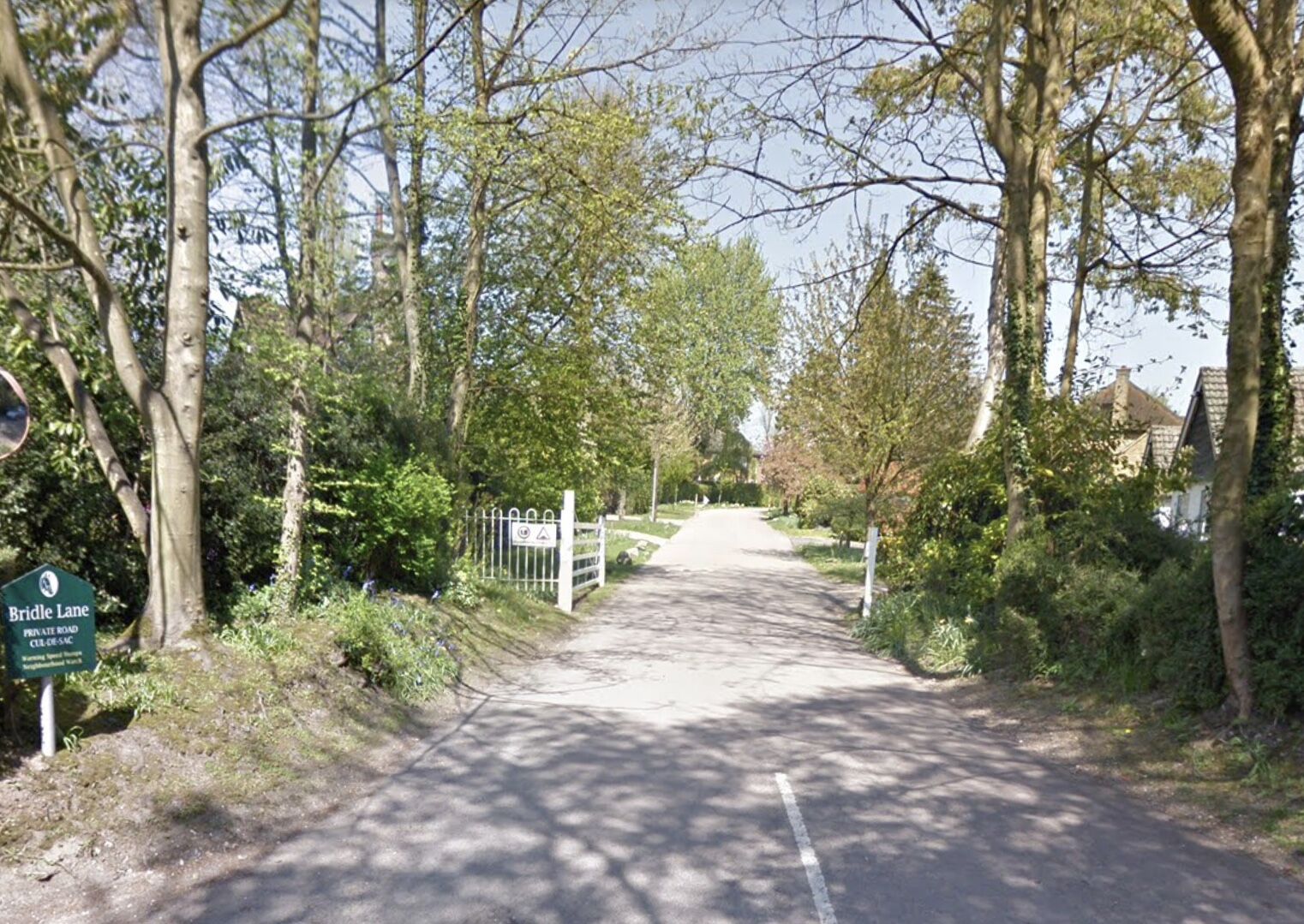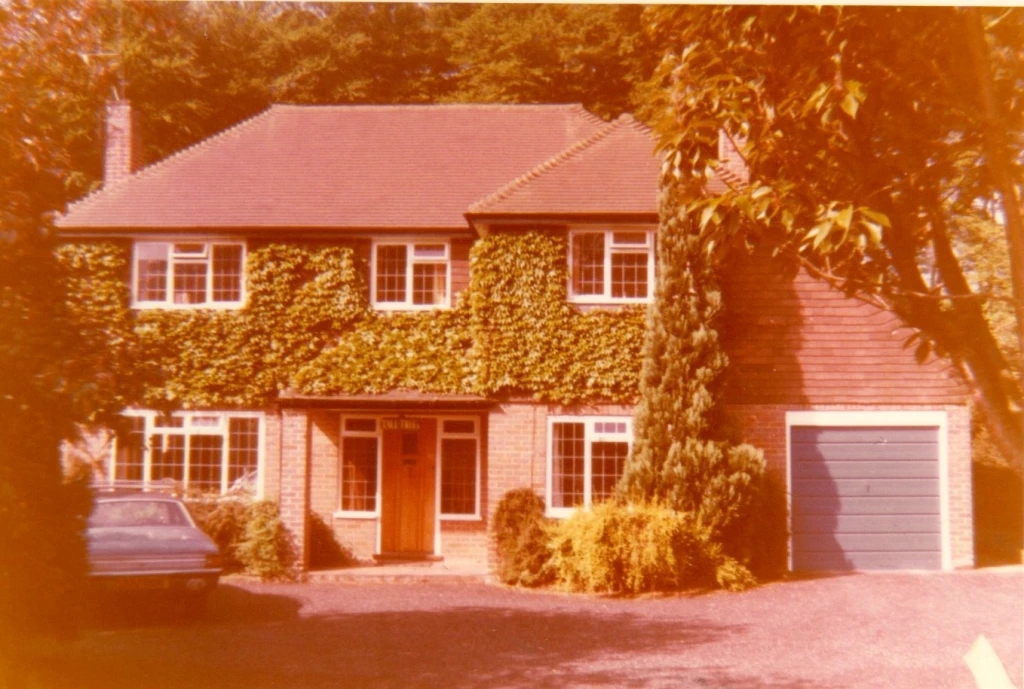Mum thought she was doing me a favour, and perhaps she was. Shopping in Rickmansworth one Saturday morning she had seen a notice at the newsagent: Paperboys/girls required. The same afternoon I was signing up for duty. It wasn’t perfect – the nearest available round was Bridle Lane in Loudwater, a hilly two miles from our home in Chestnut Avenue. But it paid thirty shillings a week – one pound ten! That was better than five bob pocket money.
It was November, and the dark mornings had arrived. Next morning I switched on my battery lamps and cycled down the rough of Park Avenue, freewheeling joyfully down Troutstream Way, and pedalling laboriously up the other side until my legs could do no more, and I had to get off and push. Mr Ward met me there and showed me the round: Bridle Lane was, and is, a genteel and quirky private road, with names not numbers if you please, and more than its share of thatched roofs and swimming pools. Presumably the children who lived there had no need of extra pocket money, or else attended boarding schools. “This can be a great job” Mr Ward confided, “when you’re up before everyone else, and the sun is shining. When it’s cold and wet, though…”. He showed me the hidden entrances and pointed out where the aggressive dogs lived. “Get it done by eight during the week, nine at the weekends.”
A few weeks in, I found a manilla envelope sellotaped to one of the front doors, marked For the Paper Boy. Inside was a ten shilling note. A decent Christmas tip for about twenty deliveries.
But the first winter was tough. The roads were frequently icy so I had to take the downhill very gingerly. Going up Troutstream Way there was grand looking house with a large window, showing a rich red carpet adorning two flights of stairs. It looked so warm and luxurious in there, I felt like an orphan boy, shut out in the cold.
And there was a girl, a pretty one, who rode with her bag of papers in the opposite direction, but we didn’t acknowledge each other. I invented scenarios where she had fallen off her bike and I came to her rescue, but it didn’t happen.
By the time I had reached Bridle Lane, my fingers were numb from clutching the handlebars, and could barely open the stack of papers, or separate them. The only effective remedy, I found, was sheepskin mittens.
Sometimes if Watford had been playing the night before, I would pounce on the pile, and pull out a tabloid to find the score inside the back page – back then newspapers actually contained news, sometimes. I would also make straight for the Daily Sketch, so I could read Peanuts.
If a customer had cancelled their papers for a holiday, still half asleep I might accidentally put the next paper in the stack through their door, at which I cursed myself. I hated to get it wrong. Someone complained that their paper was soaking wet on delivery, and I worked out that, on rainy days, it might be better to keep the paper in the bag until I reached the front door.
Sundays were good and bad. Good, because I had an extra hour in bed. Bad, because the papers were huge, especially the Sunday Times. At least they seemed huge to a small thirteen year old boy, and the narrow bag strap cut into my shoulder. If a house had a tiny letterbox, sorry but the paper was left on the doorstep, rain or shine. Fridays were heavy too, back when everyone took the Watford Observer.

We never took a bath in the morning back then, and a shower was just something I had at school after rugby. I just got back from a forty minute paper round plus a strenuous four mile bike ride in my school clothes, washed my hands – filthy from newsprint if I wasn’t wearing gloves – ate breakfast and went off to school. Did I stink? In winter probably, in summer definitely, but hey, all the boys did in those days.
Saturdays were the best. The start was late and the stack was light. And I could pick up my pay in Rickmansworth. It seemed like a fortune. I think now I should have spent it on adventures with friends, bought classic pop records, even spent it on girlfriends if only, but I was a prudent little fellow and “invested” it in my coin collection, convinced that the old coinage would soar in value after decimalisation. I still have the collection, and I’m still waiting.
Cycling four miles each morning before breakfast must have made me fitter, but I was envious of my older brother Rob, who had taken on the paper round in our road for a rival newsagent. He just had to roll out of bed and walk for five minutes to pick up his papers: sometimes I wondered if he finished the round without waking up. So I asked Mr Ward to let me know if the round in our road came free. At last it did, so I quit the Bridle Lane round and took it over. My pay went down by one sixth but the time went down by one third, and Rob and I would pass each other in the road with our bags.

Eventually, with his A-levels approaching, Rob decided to give up his round. The opportunism and ruthlessness later to characterise my business career was already taking shape, and with his cooperation I hatched a plan. Without either of us telling the shop, I took over his deliveries for two weeks, and turned up at the newsagent in Chorleywood – then on the corner of the Rickmansworth Road and Solesbridge Lane – to claim my pay.
The shop was run by a sour-faced lady with a disconcerting habit of shaking her head doubtfully while you were addressing her. At first she demurred, but I explained that Rob had quit, and I had already been doing the round for a fortnight. Her small eyes narrowed in concentration, and she must have reasoned that, indeed, the pay had not been collected, there had been no complaints from customers, and that I had saved her the inconvenience of finding someone else for the round. The job was mine, and at just fifteen, I controlled the newspaper delivery racket in Chestnut Avenue.
I experimented with doubling up: I put one bag on each shoulder and tried to complete both deliveries in one circuit, but I limped like an overburdened mule, and on Sundays the weight was impossible. In addition I would frequently have to retrace my steps when I forgot to check one of the bags for the next delivery. In the end, scientific study showed that it was no slower, and much easier, to do the rounds sequentially.
This had consequences for the disgruntled customer who, leaving for work unreasonably early, complained that his Telegraph was often arriving too late. I offered a perfunctory apology and walked on. He must have escalated his complaint to the shop, who probably reassured him that the delivery was being made before the required deadline. Soon his daily paper appeared in the rival newsagent’s stack: sadly for him this was the batch I delivered second. I like to think he saw me walk past his house, knowing that it would be another half hour before I got round to bringing him his paper. That’s what you get.
Power corrupts, they say, and hubris was setting in. There was a local evening paper, the Evening Echo, and we had a daily delivery by car. I couldn’t tolerate the presence of these incomers on my territory, so I volunteered to take it over. I was shown the round on a driving tour of Chorleywood and half of Rickmansworth, four miles, perhaps, with deliveries to about fifteen houses, dotted around the Rickmansworth Alps of Valley Road, the Clump and the Drive. It took two fellows to give me this tour: perhaps one fellow was showing me the ropes, and showing the other fellow how to show the ropes to other fellows.
Echo newsboys and newsgirls collected the money from each subscriber on Friday evening, and handed it over at base camp less their bit of pay, so pay was proportional to the number of houses on the round. With the help of a sales promotion, I hatched what seemed a brilliant business plan. I energetically canvassed my road for new subscribers, and signed up about ten. Then I toured round to the five most isolated and awkward houses on the route, and informed them that deliveries would be discontinued. I had turned a widely scattered round with fifteen subscribers into a compact one with twenty. Brilliant, no?
You might have spotted the flaw in my plan. When I returned to base next Friday, I was given one week’s money in lieu, and told that my services were no longer required. A customer had kicked up a fuss at being told he couldn’t have the Echo delivered, and the sales team had taken his side. I learned, perhaps, that the smartest business plan will fail if it upsets customers.
About this time my grandfather, a retired headmaster, expressed in a letter to my parents his disapproval at me having three paper rounds, and his concern that I might be too busy and too tired to apply myself properly to my studies. Ah, that’s why I couldn’t do calculus. Still, it gave me cover to make a graceful retreat.
By now my own A-levels were approaching, but there was still time for one more experiment on my remaining rounds in my Chestnut Avenue laboratory. I learned that some schoolfriends distributed Christmas cards on about the 10th December, to remind their customers that t’was the season to be generous. Cynical? I suppose. More cynical, though, (but perhaps it could be excused as a contribution to economic science?) would be to distribute cards only to the even numbers, and then keep a careful tally of the returns.
I estimated that the delivery of a cheap Christmas card boosted tips by an average of about 50%, which was nice to have, but this insight came too late to be useful, because before long I hung up the old shoulder bags for good. And that would have been that, but for Mrs H, a family friend who lived at number 45. She had heard that her friend across the road had received a Christmas card from the paperboy, and enquired gently with my parents whether she had upset me in some way. Er, no, sorry about that, Mrs H.

Leave a comment